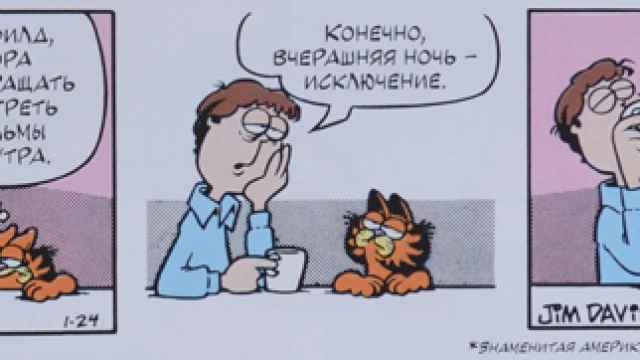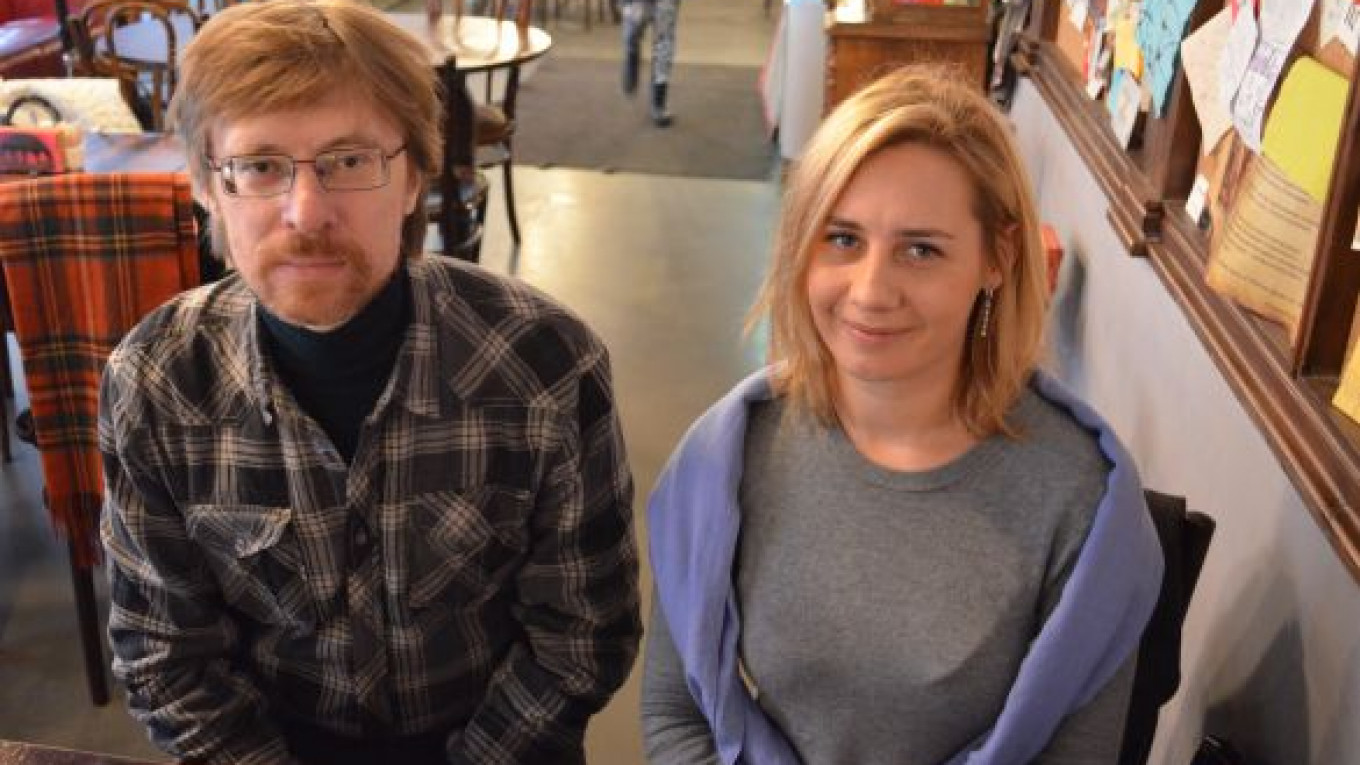Anyone who has spent time in Russia knows the Russians like cats. Elderly women spend hours coaxing strays out of cellars to feed them and most families have at least one formidable feline prowling their cramped Soviet apartment.
Thus, it may come as a surprise that only now has the hit American comic Garfield been translated into Russian. Created by Jim Davis, Garfield is among the most popular syndicated comics, depicting the life of a fat, perpetually grumpy striped cat named Garfield and his nerdy owner Jon Arbuckle, with numerous side characters.
First created in 1978, Garfield has since spawned a wide variety of books, animated films, television shows and merchandise, with the entire franchise earning up to $1 billion per year. While Garfield has appeared in numerous foreign countries, the comics have never previously made it to Russia.
"Russia practically doesn't have any of its own comics," said Elena Depeille, the brains behind the new translation from Elf Comics publishing. "Apart from just translating Garfield, we want to create a culture of comics in Russia."
The U.S. and Europe both have long traditions of comics — while comics like Garfield, The Far Side, and Calvin and Hobbes have appeared in daily newspapers in the U.S., European comics like Asterix and Tintin have also achieved great popularity and been published in regular comic books.

While most of the humor translates well, limited space was an issue, and this strip even required a footnote.
In Russia, however, there has never been such a tradition, and the only comics have been largely aimed at very young children, without any "family" comics like Garfield, which can be appreciated by many generations. While attempts have been made to try to bring comics to Russia, this lack of a tradition has meant that publishers have found a very small market for such forays.
The opaque nature of the Russian publishing industry has further complicated bringing foreign comics to Russia. Depeille described how other publishers had tried to bring comics to Russia, yet had run out of funding at some stage or not found distributors, meaning the books were not produced.
Several years ago, a Russian publisher purchased the rights to reproduce the popular Belgian Smurfs comics — the company was given the rights for three years, yet never did anything with them. Instances like this have led foreign syndicates and authors to look on Russian publishers with suspicion.
"It was difficult to get the rights to the comics; the Americans did not want to give them out," Depeille said. "For them, a big print run is 3 million; but for us even 3,000 is large, and so they didn't want to get involved." Depeille's firm has the rights to one book of comics, and said that if sales went well they hoped to do a second book in the new year.
Apart from the issues presented by obtaining the rights to the comics, the translation of the text into Russian presented another challenge. Many translators consider humor to be one of the most difficult things to translate, and it is difficult to guarantee that what Americans find funny will also be appreciated in Russia. For this reason, Depeille selected the comics very carefully, deciding to print only Garfield and a few series of French comics, all of which she felt were universally funny.
"The format was probably one of the most difficult parts of the translation," said translator Mikhail Khachaturov. "The speech bubbles are small, and there are very strict limitations on the size of the text. Since phrases in Russian tend to be longer than their English counterparts, Khachaturov had to be very creative to make the text fit in the appropriate space, occasionally making up expressions in Russian to find the most concise translation.
While Russian audiences may be slow to warm to the idea of comics, Depeille and Khachaturov report that sales are promising so far. The book is currently on sale at more than 250 locations, including brick-and-mortar chains like Biblioglobus and Respublika as well as online retailers like Ozon.ru.
Contact the author at [email protected]
A Message from The Moscow Times:
Dear readers,
We are facing unprecedented challenges. Russia's Prosecutor General's Office has designated The Moscow Times as an "undesirable" organization, criminalizing our work and putting our staff at risk of prosecution. This follows our earlier unjust labeling as a "foreign agent."
These actions are direct attempts to silence independent journalism in Russia. The authorities claim our work "discredits the decisions of the Russian leadership." We see things differently: we strive to provide accurate, unbiased reporting on Russia.
We, the journalists of The Moscow Times, refuse to be silenced. But to continue our work, we need your help.
Your support, no matter how small, makes a world of difference. If you can, please support us monthly starting from just $2. It's quick to set up, and every contribution makes a significant impact.
By supporting The Moscow Times, you're defending open, independent journalism in the face of repression. Thank you for standing with us.
Remind me later.


